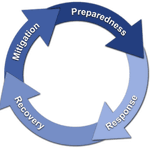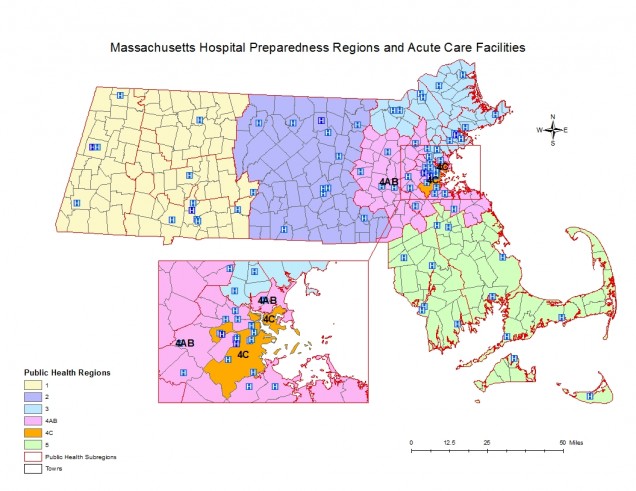Health and Medical Coordinating Coalitions (HMCC)
Regional preparation and response to emergencies
Floods, chemical spills, power failures, hurricanes, ice storms, terrorist attacks – these events can and do happen in Massachusetts. Emergency management and preparedness is how we take care of each other when such disasters strike. Emergency preparedness means being prepared for all kinds of emergencies, able to respond in time of crisis to save lives and property, and to help a community return to normal life after a disaster occurs.
Without county governments or other regional infrastructure, Massachusetts is challenged to prepare for and respond to serious and large-scale emergencies. An emerging new structure – Health and Medical Coordinating Coalitions (HMCC) – will help us prepare and respond more effectively. Between now and mid-2017, six regional HMCC will be formed in Massachusetts.
What is an HMCC?
An HMCC is a formal regional collaboration among public health and healthcare organizations to prepare for and respond to an emergency, mass casualty or other catastrophic health event.
The core members of each HMCC will include a region’s:
- Community health centers and other large ambulatory care organizations
- Hospitals and other acute care facilities
- Nursing homes and other long-term care facilities
- Public health agencies
- Public and private emergency medical services
Other health care disciplines (such as home health providers, dialysis centers, mental health agencies) and first responders such as police, fire and emergency managers are also likely to be incorporated. An HMCC will not take the place of existing first responder procedures, but it can help coordinate their response with health care and public health organizations whose participation can be vital in a major emergency.
The HMCC model will also help Massachusetts comply with new federal requirements for a more integrated approach to emergency preparedness and response that builds capacity across the phases of the disaster cycle: preparedness, response, recovery and mitigation.
Once they are up and running, HMCC will coordinate regional efforts across all phases of the disaster cycle, make sure that information is shared quickly and stay involved until the emergency is over. An HMCC can coordinate preparedness and response across a larger area in ways that individual agencies in separate communities cannot.
How are HMCC being developed?
The Massachusetts Department of Public Health, through its Office of Preparedness and Emergency Management (OPEM), is leading the effort – supported by the Boston University School of Public Health (BUSPH).
Starting in late 2013, staff from OPEM and BUSPH began meeting with organizations and other stakeholders and organizations across the Commonwealth to discuss the process for establishing HMCC, and facilitated meetings to begin f planning each region’s strategy for establishing its HMCC. The next four years will see a phased approach to these new structures, with six HMCC up and running by June 30, 2017.
Massachusetts has had its share of emergencies
September 11 and Hurricane Katrina are seared into our national memory, but Massachusetts has had its own emergency situations over the last few years, including the Boston Marathon bombings, Hurricane Sandy, nor’easters, the H1N1 influenza pandemic and the Western Massachusetts tornadoes of 2011.
For example, a no-name December 2008 ice storm left hundreds of thousands in Massachusetts without power, made major roadways and secondary roads impassible due to downed tree limbs and power lines, forced thousands to leave their homes and caused many elderly people and those dependent on oxygen or electrically operated medical equipment to seek refuge at local hospitals. Many shelters, hospitals and long-term care facilities had to rely on emergency generators for an extended period, and community health centers without power were forced to cancel patient appointments, keep staff at home and temporarily close.
Each emergency has taught us important lessons about how to prepare for and respond to the next one. The HMCC will be incorporating these lessons as they develop their membership, infrastructure and plans over the next several years.
The HMCC regions
The six HMCC regions are the same as the Commonwealth’s existing hospital preparedness regions:
1: Western 2: Central 3: North 4A and 4B: Metro Boston
4C: Boston 5: South Shore, Cape and Islands
Click on the map to view larger image



